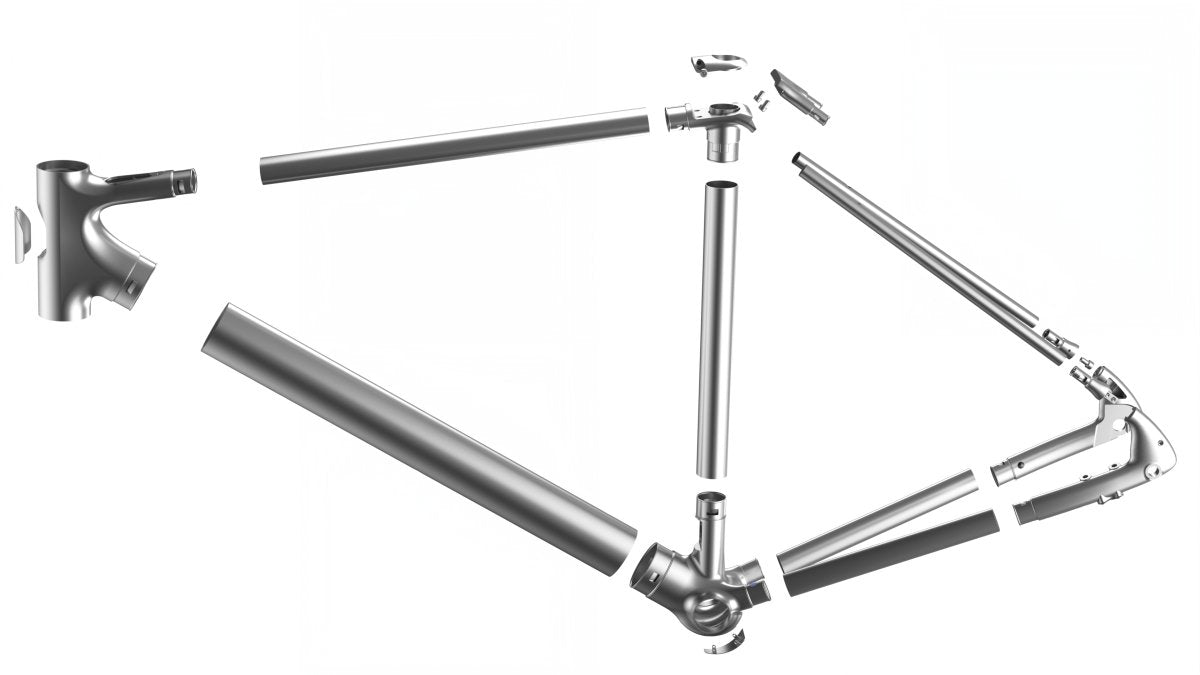
Titanium frame construction: Art meets innovation at MÖVE and VER-TEC
Titanium, the metal of the gods, has long been the backbone of high-end bicycle manufacturing, known for its outstanding durability, corrosion resistance and lightweight properties. This lightweight metal has a solid niche in the world of bicycle frame building, particularly in the manufacture of high-end road and mountain bikes. Before we explore VER-TEC's innovative advancements, it's important to understand the traditional art of titanium frame building.
The traditional art of titanium frame construction
Building a classic titanium frame is a highly specialized craft that requires precision and expertise. Originally developed in the early 1980s in Bolzano, Italy, where the first titanium frame was welded, this technique requires a thorough knowledge of the material's properties. Titanium is the heaviest of the light metals, but also incredibly resistant to temperatures and corrosion. Its processing requires special tools and techniques, as the material is very different from aluminum or steel.
Titanium frame construction often uses an alloy enriched with 3% aluminum and 2.5% vanadium to increase strength. This alloy, known as TiAl3V2.5, allows frame builders to create extremely lightweight but strong bike frames. The process involves precise welding and often hydroforming of tubes to achieve the desired frame geometry and mechanical properties required for different types of bikes. Each frame is a work of art that is both functional and aesthetically pleasing, which is reflected in the cost to end users.
Innovation through VER-TEC
The engineers at MÖVE, the creators of VER-TEC, have taken this traditional craftsmanship into a new era. They have developed a technology that allows titanium frames to be produced efficiently and in series in Germany. This innovation represents a significant step forward as it improves the cost-effectiveness and accessibility of titanium frames without compromising on quality.
In the future, MÖVE plans to use recycled titanium powder from titanium chips for 3D printing based on the research project "Return II" from Leibniz University Hannover. This process will make it possible to produce 3D-printed frame sleeves that complement traditional frame construction techniques and continue to meet the high standards of lightness and stability.
The combination of tradition and innovation
MÖVE and VER-TEC are thus at the interface of traditional craftsmanship and the latest technology. By using recycled titanium powder and advanced manufacturing methods, they help reduce environmental impact and promote the circular economy in the bicycle industry. The commitment to sustainability and innovation is reflected in every VER-TEC frame, which is valued not only for its technical superiority but also for its environmentally friendly production.
Injection bonding: MÖVE's key technology for high-quality titanium frames
Another breakthrough in the production of titanium frames by MÖVE and VER-TEC is the application of injection bonding. This process uses advanced adhesives to create a permanent, heavy-duty bond between the individually manufactured titanium sleeves and the hydroformed titanium tubes. The process begins with the precise insertion of the tubes into the sleeves, followed by the injection of a specially developed epoxy resin adhesive into the prepared bonding chambers of the frame structure.
The advantages of this procedure are manifold:
- Increased production speed : Due to the rapid and efficient curing of the adhesive, often within minutes, injection bonding accelerates the entire manufacturing process.
- Exceptional strength and durability : The epoxy resin adhesives used offer outstanding strength and are resistant to physical and chemical influences, which significantly extends the lifespan of the bicycle frames.
- Precision and quality control : The controlled injection of the adhesive enables uniform distribution within the joint, ensuring consistently high quality connections.
- Flexibility in design : The adhesive's ability to adapt to different shapes and materials opens up new possibilities in frame construction that traditional methods cannot offer.
- Environmental friendliness : Compared to traditional welding processes, bonding does not release toxic fumes, making the process more environmentally friendly.
This technology represents a significant advancement in bicycle frame production and allows MÖVE to merge the traditional craftsmanship of frame building with the latest technologies. The result is high-quality, customized and durable titanium frames made in Germany, dramatically increasing production efficiency and capacity.
Conclusion
Titanium frames from MÖVE and VER-TEC symbolize the perfect harmony between proven craftsmanship and the future of bicycle manufacturing. They not only offer bicycle enthusiasts a robust and lightweight solution, but also represent a commitment to environmental sustainability and technological excellence. With every "Titanium E-Bike" and "Titanium Gravel E-Bike" from Germany, they set new standards in the bicycle industry.